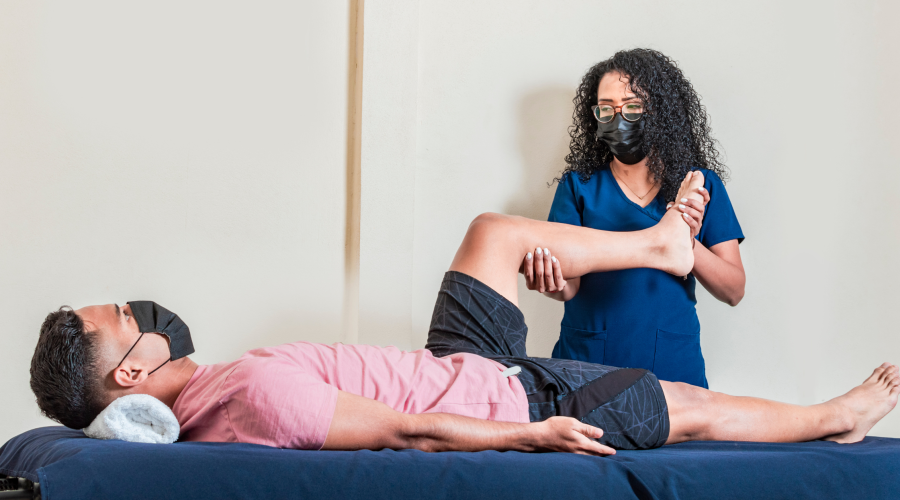Kinesiology therapy is a form of energetic bodywork that taps into your body’s innate intelligence using biofeedback from your muscles.
It helps to identify physical imbalances, beliefs, and information from your body and subconscious mind to guide you towards a state of balance.
Confused?
This article will answer all your questions about the benefits of kinesiology therapy, and what you can expect during an appointment.
Table of contents
What is kinesiology therapy?
Kinesiology is a bodywork therapy that falls under the alternative medicine umbrella. It’s also known as muscle testing, kinesiology therapy, applied kinesiology, or systematic kinesiology.
Practitioners use muscle testing to receive feedback and create a line of communication between your subconscious mind and your body. In doing so, it may help to find and resolve imbalances in the body’s energy system.
Practitioners believe they can identify the root cause behind symptoms – something conventional medicine sometimes misses.
This practice is often confused with the study of human movement, also known as kinesiology. However, kinesiology works with physical, mental, emotional, and spiritual imbalances.
The origins of kinesiology
The chiropractor George Goodheart Jr. first developed kinesiology as a diagnostic tool in 1964.
Nowadays, several types of muscle testing are used by natural healthcare practitioners.
How does kinesiology work?
Kinesiology integrates elements of traditional Chinese medicine (TCM) and chiropractic care. It believes the body has an intelligent energy field – known as Qi energy – that runs along energy meridians in the body.
This energy field is central to how kinesiology therapy works.
Practitioners ask the client to hold their arm out in front of them in an isometric hold. They must resist when the practitioner applies gentle pressure to this indicator muscle while asking questions (and using other cues). If there is a disturbance in the energy flow (caused by stress), it may manifest as your arm muscles weakening or “unlocking.” If the muscles remain strong, it’s a sign that the energy system is in balance.
But how can your muscles be weak one minute but strong the next?
It doesn’t measure muscle strength but nervous system function. This is influenced by stress, poor lifestyle, repressed emotions, nutritional deficiencies, and more. It is when the brain is engaged and deciding in that instant whether to do something about the threat (the test vial, the thought) at which point the muscle weakens, or whether there is no threat and therefore the muscle does not change.
When and how is kinesiology used?
Kinesiology determines weaknesses in the body’s energy system. The practice also guides practitioners to the root cause of symptoms and lifestyle corrections that support healing.
For example, someone with digestive discomfort may hold a certain food in their left hand while the therapist applies light pressure to the right arm. If the arm goes weak, it indicates that the food may be weakening the energy field.
This same process is applied when the practitioner asks questions about physical, mental, emotional, and spiritual aspects of your health. You may imagine a situation, event, or person as the practitioner applies pressure to the indicator muscle to identify if it’s affecting your health.
Kinesiology is used in a range of situations
People commonly seek out kinesiology for the following reasons, however more research is required to support its efficacy, and you should always speak to your GP or qualified medical practitioner before booking any appointments:
- Digestive disorders
- Fatigue
- Low mood and anxiety
- Ongoing pain
- Insomnia
- Hormonal imbalances
- Post-traumatic stress disorder
- Allergies
- Food sensitivities
- Acne
- Headaches
- Phobias and limiting beliefs
- Addictions
- Poor immunity
- Low motivation
- Unhealthy coping behaviours
- Weight gain
- Learning disabilities
Kinesiology muscle testing can’t cure any conditions. However, it may help you move toward healing by identifying areas of imbalance.
Some of the benefits of kinesiology include more energy, less pain, a happier mood, more motivation.
What is the evidence to support kinesiology?
While kinesiology has a large following, there is no scientific evidence it is an effective diagnostic or treatment tool.
However, an older study on muscle testing found the indicator muscle remained strong for longer when participants said a truthful statement compared to an untrue statement (1).
What to expect as an kinesiology patient
You don’t need to dress a certain way or prepare anything for the session. That said, a practitioner may request you bring along dietary supplements to evaluate against your energy field. Each practitioner is different, so check with them when booking your appointment
An appointment can last between 45-90 minutes.
The kinesiology appointment
During the initial kinesiology appointment, the practitioner will take a detailed health history and ask about your health goals.
Next, you’ll sit on a comfortable chair or lie on a therapy bed as the practitioner demonstrates muscle testing. They may ask you to say your name aloud to identify your body’s “true” response.
During the session, different muscle-testing techniques will identify areas of stress and imbalance. Your practitioner will talk you through what they are doing. The practitioner may ask questions as they press down on your arm to pinpoint energy imbalances and find treatment protocols.
It’s normal to experience an emotional release during kinesiology therapy.
At the end of the appointment, your practitioner will review what they discovered and talk you through the lifestyle changes and exercises that may help towards your health goals.
How will you feel after an appointment?
You may feel lighter and more relaxed after a session. Equally, you may feel energised, emotional, lightheaded, or “zoned out” or exhausted. This is normal, and there is no right way to react to a session.
Your practitioner will ask you to drink water after the session and take it easy as your body integrates the experience.
How do I find a kinesiology practitioner, and what qualifications should they have?
Kinesiology practitioners should complete a three-month in-person diploma course. They may also need to complete anatomy, physiology, and nutrition modules.
Unfortunately, there are no laws governing it as a practice. So, you want a practitioner registered with a recognised professional body.
Examples of governing bodies in the UK include:
- The Kinesiology Association (KA)
- Complementary and Natural Healthcare Council (CHNC)
- Association of Naturopathic Practitioners (ANP)
Many kinesiologists also have training in chiropractic, craniosacral therapy, reflexology, naturopathy, and homoeopathy.
Use our Treatwiser search tool to find an experienced practitioner in your area. And of course read testimonials given for the practitioner.
How much will it cost?
Kinesiology therapy is not available on the NHS. Private sessions vary depending upon your practitioner.
How many appointments will I need?
Each treatment plan is different as everyone starts their treatment at a different point in their health journey. Some people notice results immediately, while others need more time.
Practitioners usually recommend an initial session of 90 minutes, followed by some followup sessions. The first appointment tends to find the most important issues (low-hanging fruit) whilst further sessions are more likely to uncover the deep-lying issues. After that, you may go for “tune-up” sessions every few months.
That said, many practitioners will use a muscle testing technique to see when follow-up sessions are necessary.
What are the risks associated with kinesiology?
Kinesiology is a non-invasive, risk-free therapy that comes with no side effects.
However, there is a risk that someone would refuse conventional treatment in favour of muscle testing. Always talk to your doctor about any complementary therapies you are using.
Resources and further kinesiology information
- Monti et al. (1999). Muscle test comparisons of congruent and incongruent self-referential statements. Percept Mot Skills.
DISCLAIMER: The Site cannot and does not contain medical / health advice. The medical / health information is provided for general informational and educational purposes only and is not a substitute for professional advice. Accordingly, before seeking any form of medical advice, diagnoses or treatment based upon such information, we encourage you to consult with your GP or other qualified health practitioner. You must never disregard professional medical advice or delay in seeking it because of something mentioned on this Site. The use or reliance of any information contained on the site is solely at your own risk.





